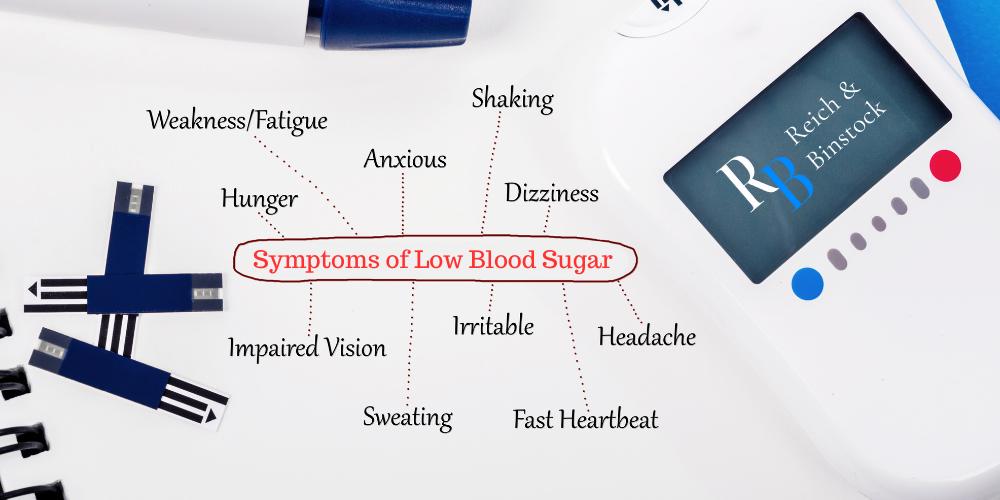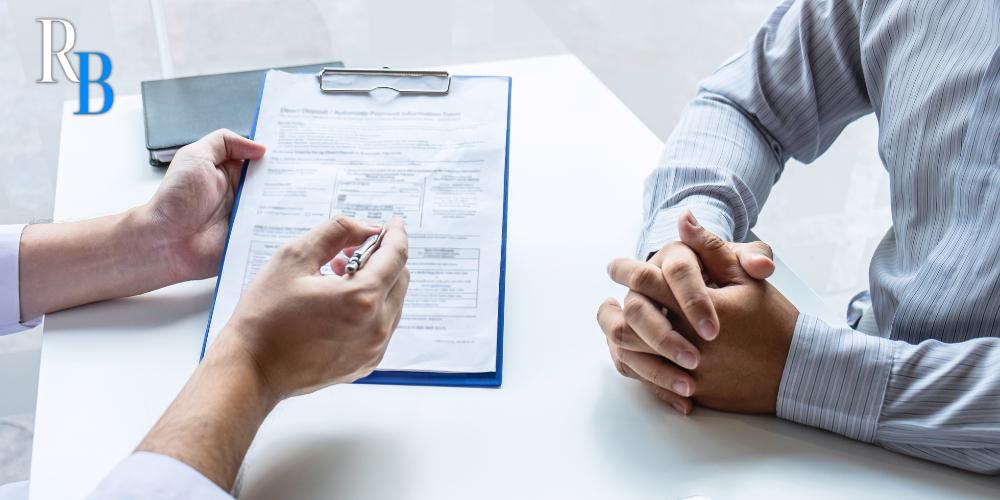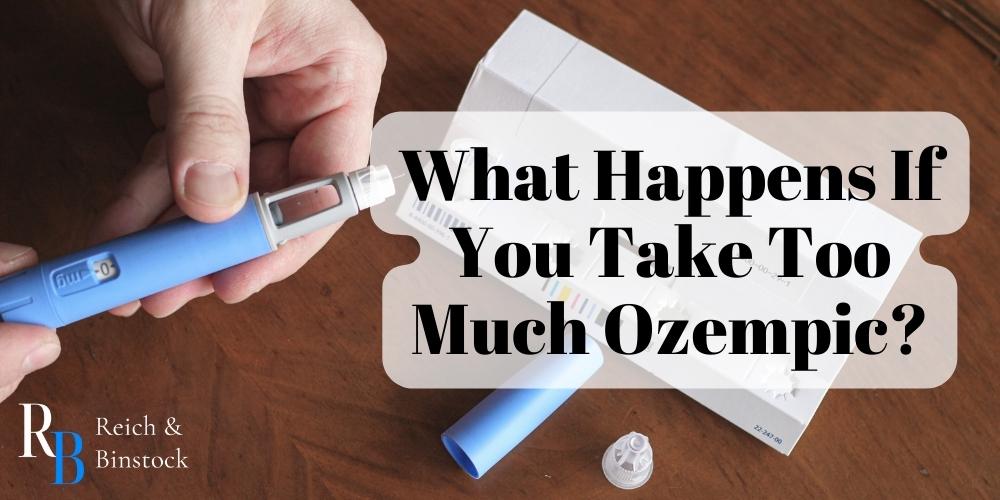By now, most people have heard of Ozempic, the trendy weight loss drug many celebrities have credited for their sudden transformations. In reality, Ozempic isn’t actually a weight loss drug, or at least that’s not its intended purpose. The FDA originally approved it as a medication for adults with Type 2 diabetes, but it has been appropriated for weight loss. However, Ozempic’s manufacturer has recently come under fire for its failure to warn about the drug’s serious side effects. So, what happens if you take too much Ozempic? What problems can it cause for consumers?
The Ozempic lawsuit attorneys at Reich & Binstock understand that unexpected side effects from medications can greatly impede one’s life. If you have suffered from gastroparesis (stomach paralysis) or other gastrointestinal issues after taking Ozempic, you may have a valid claim. To learn if you qualify for an Ozempic lawsuit, contact our law firm right away. Schedule your free, no-obligation consultation by calling 713-622-7271 today.
What Is Ozempic?
Ozempic is an injectable medication approved by the FDA for managing blood sugar levels in adults with Type 2 diabetes. It is a weekly injection that lowers blood sugar levels by helping the pancreas produce more insulin. Insulin is a hormone that regulates the amount of glucose in the blood.
Side Effects of Ozempic
According to the medication’s website, the most common side effects of Ozempic include the following.
- Nausea
- Diarrhea
- Abdominal pain
- Vomiting
- Constipation
One of the bad side effects of Ozempic, gastroparesis, is not listed on the drug’s prescribing information. However, in August 2023, many patients filed claims against Novo Nordisk, the drug’s manufacturer. These lawsuits claim that Novo Nordisk failed to warn patients of the risk of gastroparesis despite having knowledge of the risk.
Certain others have claimed that Ozempic can increase one’s risk of developing thyroid tumors, but currently, no research has supported this claim. The main injuries listed in the ongoing Ozempic lawsuits are stomach paralysis, intestinal blockage, and other gastrointestinal issues.
What Is Ozempic Used For?
The FDA-approved purpose of Ozempic is to treat Type 2 diabetes. However, many celebrities, social media influencers, and others have used it to lose weight quickly. Some doctors have begun prescribing Ozempic for weight loss, but this is considered an off-label use. Many people have seen drastic results from taking Ozempic for weight loss, but this does not mean the drug is safe to use for that purpose.
Ozempic and Controlling Blood Sugar Levels for Diabetes Management
In order to lower blood sugar levels in the body, Ozempic mimics a hormone that occurs naturally in the body. It helps the pancreas produce more insulin, which will lower blood sugar levels. The hormones that Ozempic mimics also send signals to the brain to tell your body that you feel full. They also slow food digestion by increasing the amount of time it takes for food to pass through the digestive system.
What Are the Risks of Taking Ozempic for Weight Loss?

Ozempic is a prescription medication that was approved by the FDA for a specific purpose. When used for weight management or weight loss, serious side effects may occur. One major reason why people should not take Ozempic for weight loss is because it has resulted in shortages. This makes it more difficult for people with Type 2 diabetes to get the medication they need to control their diabetes.
Other potential risks of off-label use of Ozempic include the following.
- Drug interaction risks when taking the medication without proper medical supervision
- Severe side effects like hypoglycemia, allergic reactions, diabetic retinopathy, gallstones, kidney failure, and other issues
- Weight gain after stopping the medication without making lifestyle changes
How Does Ozempic Work in the Body?
The active ingredient in Ozempic, semaglutide, works for weight loss by inducing feelings of satiety, suppressing appetite. It works to regulate blood sugar levels by helping the pancreas produce insulin. It mimics a natural hormone, called GLP-1, which is normally supposed to be produced when the body detects nutrients after eating. GLP-1 signals to the brain and body that it is time to break down the food someone has eaten and turn it into usable energy.
What Are the Signs and Symptoms of Ozempic Overdose?
As with many drugs, it is possible to overdose on Ozempic. It is not recommended to exceed one’s prescribed Ozempic dosage or to take doses too close together. The immediate signs of taking too much Ozempic include symptoms like the following.
Physical Symptoms of Overdose
- Low blood sugar levels (hypoglycemia): excessive sweating, shaking, nausea, intense hunger, heart palpitations, blurry vision, confusion, seizures, or loss of consciousness.
- Gastrointestinal problems: nausea, abdominal pain, vomiting, or diarrhea.
- Weight loss and decreased appetite: potential complete loss of appetite.
- Rapid heart rate: called tachycardia, this occurs when the body tries to compensate for low blood sugar.
- Fatigue: low energy levels and exhaustion.
Low Blood Sugar or High Blood Sugar
Overdosing on Ozempic can result in higher or lower blood sugar levels than are acceptable. Symptoms of low blood sugar include shaking, sweating, headaches, tachycardia, fatigue, anxiety, confusion, irritability, nausea, and intense hunger. Symptoms of high blood sugar include tiredness, blurry vision, frequent urination, dry mouth, increased thirst, recurring infections, and weight loss.
What Are the Risks of Overdosing on Ozempic?
Taking too much Ozempic can have serious consequences for one’s health. One can experience severe hypoglycemia (low blood sugar) and many other issues in the short term. But what are the long-term risks of taking too much Ozempic?
Long-Term Health Effects of Ozempic Overdose
Having dangerously low blood sugar (hypoglycemia) for prolonged periods of time can lead to organ damage. Specifically, it can damage the heart, kidneys, eyes, and nerves. One’s quality of life can be seriously affected by taking too much Ozempic. Two conditions that could develop are diabetic retinopathy and diabetic nephropathy.
Other potential long-term effects include an increased risk of cardiovascular disease, damaged blood vessels, and peripheral neuropathy. But how long does Ozempic stay in your system? It’s important to speak with a physician to learn more about the risks of taking this medication for prolonged periods.
Long-Term Psychological Effects of Ozempic Overdose
In recent months, researchers have begun looking into potential mental health side effects linked to Ozempic. Anxiety, depression, and suicidal ideations have been experienced by hundreds of people who have taken Ozempic, but these side effects are not listed in the instructions for use.
Wegovy, however, does have these side effects listed in their instructions. Ozempic and Wegovy use the same active ingredient, semaglutide. More research is needed to confirm whether or not there exists a link between Ozempic and mental health issues. However, current evidence seems to suggest a link between the two.
What Are the Treatments for Ozempic Overdose?
When someone overdoses on Ozempic, it is crucial that they receive medical care as soon as possible. The sooner someone can get treatment for the overdose, the better, as this minimizes the potential harm caused by the overdose. In the following sections, we explain how to respond when someone accidentally takes too much Ozempic.
Emergency Treatments
First, seek immediate medical attention in an emergency setting. The initial treatment generally involves administering glucose or glucagon intravenously to raise the patient’s blood sugar. Depending on how serious the overdose was, doctors will likely monitor the patient’s vitals and give any necessary supporting care.
Monitoring and Follow-Up Care
Once the patient’s condition has stabilized, the doctor will monitor their blood sugar levels with regular blood tests. Depending on the patient’s needs, their doctor may adjust their dosage. They will also advise the patient on how to avoid overdoses in the future.
How to Prevent Ozempic Overdose

Maintaining healthy blood sugar levels is crucial for staying healthy. It’s important to strictly adhere to your doctor’s instructions about taking Ozempic. One missed dose may not affect you much, but consistently missing doses could affect you in the long run. Additionally, it is crucial not to exceed your maximum dose. Taking too much Ozempic could lead to low blood sugar, which carries a whole host of problems.
Below, we outline ways in which you can avoid overdosing on Ozempic.
Properly Administer the Correct Dosage
When your doctor prescribes a particular dosage for your medication, they do so for a reason. Different patients have different body types and individual needs, which means each prescription is tailored to each patient. It is extremely important to adhere to your correct dosage and to administer your dosage on schedule.
Before making any changes to your Ozempic dosage or schedule, consult with your doctor
Attend Regular Check-Ups
Because of the importance of managing your blood sugar levels, it is a good idea to attend regular check-ups with your doctor. These check-ups will allow your doctor to monitor your diabetes, as well as make any necessary adjustments to your prescriptions. If any potential issues do occur, your doctor should be able to catch them in the check-up and address them immediately.
Contact an Ozempic Lawsuit Attorney with Reich & Binstock
At Reich & Binstock, we understand how scary it can be when a defective drug leads to serious side effects. If you have suffered gastroparesis or other gastrointestinal issues after taking Ozempic, you may have a case. Call Reich & Binstock at 713-622-7271 today to schedule a free consultation with our drug injury attorneys.














